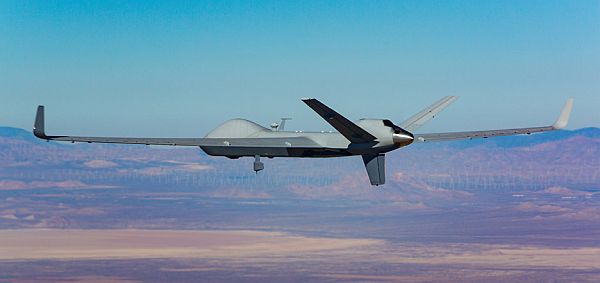Podcast: Play in new window | Download (Duration: 31:40 — 21.8MB)
A General Atomics remotely piloted drone flew across the Atlantic, military drone documents found on the dark web, Google’s delivery drone project moves forward, and recreational drone registration reaffirmed.
UAV News
First ever trans-Atlantic drone flight lands in UK
The civilian-registered and remotely piloted General Atomics MQ-9B SkyGuardian flew 3,760 nautical miles from the Grand Sky park at the Grand Forks Air Force in North Dakota to the Royal Air Force (RAF) Fairford in Gloucestershire, UK in 24 hours and two minutes. General Atomics Aeronautical Systems Inc. (GA-ASI) says, “MQ-9B is the next generation of GA-ASI’s multi-mission Predator® B fleet. GA-ASI named its baseline MQ-9B aircraft SkyGuardian, and the maritime surveillance variant SeaGuardian. MQ-9B is a “type-certifiable” version of the MQ-9 Predator B product line. It’s [an]… RPA that can meet the stringent airworthiness type-certification requirements of various military and civil authorities, including the UK Military Airworthiness Authority (MAA) and the U.S. FAA… Type-certification, together with an extensively tested collision avoidance system, will allow unrestricted operations in all classes of civil airspace.”
AOPA Drone Social tickets almost gone
A few free seats remain available for the AOPA Drone Social during EAA AirVenture in Oshkosh, Wisconsin, on July 27, 2018. Food and beverages will be provided, and a 20-minute presentation by event sponsor PrecisionHawk will be followed by time to network and socialize. Register now.
US Reaper drone data leaked on dark web, researchers say
Someone hacked into an Air Force captain’s computer and accessed documents. They included a private list of airmen working with General Atomics MQ-9A Reaper drones as well as maintenance and course material. The threat intelligence firm Recorded Future posted in their blog post, Military Reaper Drone Documents Leaked on the Dark Web, “On June 1, 2018, while monitoring criminal actor activities on the deep and dark web, Recorded Future’s Insikt Group identified an attempted sale of what we believe to be highly sensitive U.S. Air Force documents. Specifically, an English-speaking hacker claimed to have access to export-controlled documents pertaining to the MQ-9 Reaper unmanned aerial vehicle (UAV). Insikt analysts engaged the hacker and confirmed the validity of the compromised documents. Insikt Group identified the name and country of residence of an actor associated with a group we believe to be responsible. This analysis is available to our customers via Insikt’s blog. We continue to assist law enforcement in their investigation.”
Google’s Parent Births New Businesses: Balloons and Drones
Two projects operated within the research lab of Google’s parent company Alphabet have now been moved out of the research lab and into their own Alphabet business units. “Wing” is the delivery drone project using fixed-wing VTOL drones that have made test deliveries in Australia. “Loon” is the high altitude balloon project that provides internet connectivity for rural or disaster areas.
FAA Says Avoid Drone Registration Schemes
The FAA warns against entities that offer to help drone owners and operators file an application for a registration number. Some attempt to mimic the look of the FAA’s website with similar graphic design and even the FAA logo. You can easily register yourself for $5 at the FAA Drone Zone. These registrations apply to those flying for recreational, commercial, governmental, or other purposes under Part 107. Also to those flying model aircraft under Section 336, the special rule for model aircraft.
Drone Regulations in U.S. Withstand a Hobbyist’s Legal Challenge
Back in episode 195, we reported that the U.S. Court of Appeals for the District of Columbia Circuit struck down the FAA’s drone registration requirement for recreational UAV operators. John A. Taylor argued that the FAA requirement violated the 2012 FAA Modernization and Reform Act passed by Congress. Since then, Congress passed a law allowing registration of hobbyist drones. Taylor requested that FAA rules be invalidated arguing that all hobbyists, not just those exempted by Congress, should be exempt from the law. But the appellate court said, “Because the rule is within the agency’s statutory authority and is neither arbitrary nor capricious, the petition for review is denied.”
UAV Video of the Week
Travis AFB 4th of July ft. Intel® Shooting Star Drone Light Show
Mentioned
LAANC Turned Off at 6 Airports

